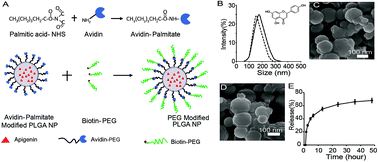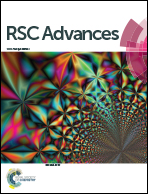Anti-inflammation and anti-fibrosis with PEGylated, apigenin loaded PLGA nanoparticles in chronic pancreatitis disease
Abstract
Chronic pancreatitis (CP) is a disease that imposes great suffering on people’s lives with symptoms such as chronic abdominal pain, diabetes, impaired digestion, high risk of pancreas cancer, etc. However, treatment of CP is limited by the lack of effective therapies. In this work, apigenin, a drug that can inhibit pancreatic stellate cell fibrosis, is loaded into PEGylated PLGA nanoparticles to treat CP. The nanoparticles have a diameter around 160 nm and loading efficiency of 96 μg apigenin per mg PLGA nanoparticles. Our studies find that apigenin loaded nanoparticles can inhibit PSC growth and promote PSC apoptosis. To investigate the mechanism of apigenin in treating CP, PSCs with pro-inflammatory and pro-fibrotic responses are treated with apigenin loaded nanoparticles and analyzed with RT–PCR. Our study finds that apigenin loaded nanoparticles can reduce the expression of mRNAs associated with PSC pro-inflammation and pro-fibrosis (e.g. collagen 1A1 mRNA, fibronectin mRNA and IL-6 and IL-8 mRNAs). An in vivo study finds that apigenin loaded in PEGylate PLGA nanoparticles has a longer circulation time in mice than apigenin in its free form. Consistent with the in vitro study, the in vivo study also confirms the anti-inflammation and anti-fibrosis effects of PEGylated, apigenin loaded PLGA nanoparticles through reducing the inflammation and fibrosis associated mRNAs.


 Please wait while we load your content...
Please wait while we load your content...